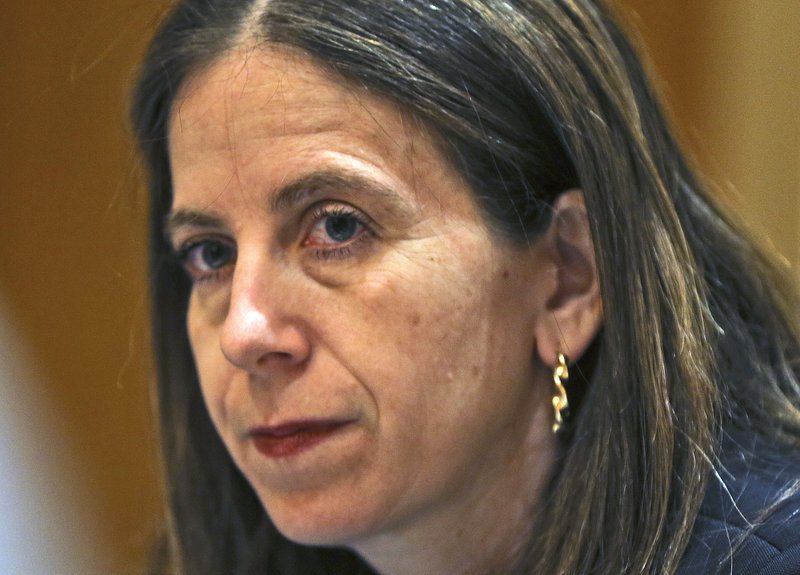BRUSSELS -- President Donald Trump on Thursday forecast an unspecified "escalation" between the United States and Iran following his withdrawal from a landmark deal that provided sanctions relief for Tehran in exchange for curbs on its nuclear program.
Trump's remarks came as his administration pressed European nations at a NATO summit to cut off all funding that Iran may use to foment instability in the Middle East and beyond.
Trump asserted that Iran was now treating the U.S. with more respect, although there's no evidence to support that, and predicted Tehran will seek negotiations as reimposed sanctions bite.
"I would say there might be an escalation between us and the Iranians," Trump said at a news conference in Brussels.
"They're treating us with much more respect right now than they did in the past and I know they're having a lot of problems and their economy is collapsing. But I will tell you this, at a certain point, they're going to call me and they're going to say 'Let's make a deal,' and we'll make a deal.' But they're feeling a lot of pain right now," he said.
Over the opposition of European allies, the president in May pulled out from the 2015 nuclear deal involving Iran, the U.S. and other world powers. Washington's reinstating of economic penalties has worsened Iran's already-hobbled economy.
After the NATO summit ended Thursday, U.S. Secretary of State Mike Pompeo met with European officials to make the case for clamping down on Iranian "terrorism and proxy wars."
"We ask our allies and partners to join our economic pressure campaign against Iran's regime," Pompeo said in a tweet before the talks.
"We must cut off all funding the regime uses to fund terrorism and proxy wars. There's no telling when Iran may try to foment terrorism, violence & instability in one of our countries next." The tweet was accompanied by a map accusing Iran of sponsoring at least 11 terrorist attacks in Europe since 1978.
In another post, Pompeo said "Iran continues to send weapons across the Middle East, in blatant violation of UN Security Council resolutions. Iran's regime wants to start trouble wherever it can. It's our responsibility to stop it."
Other U.S. officials have fanned out around the globe to warn foreign governments to stop buying oil from Iran or face sanctions. Pompeo also has accused Iran of using its embassies to plot terrorist attacks in Europe.
"Just this past week there were Iranians arrested in Europe who were preparing to conduct a terror plot in Paris, France. We have seen this malign behavior in Europe," Pompeo said in an interview on Tuesday with Sky News Arabia in Abu Dhabi.
He was referring to the arrest of an Iranian diplomat posted to Vienna who allegedly was involved in the plot to bomb an Iranian opposition group rally in France on June 30. The envoy's arrest in Germany came after a couple with Iranian roots was stopped in Belgium and authorities reported finding powerful explosives in their car.
Iran denies involvement and contends the allegations against its diplomat are intended to damage its relations with the European Union.
The diplomat, Assadollah Assadi, was charged Wednesday in Germany with activity as a foreign agent and conspiracy to commit murder.
He is suspected of contracting a couple in Belgium to attack an annual meeting of an exiled Iranian opposition group in Villepinte, near Paris, German prosecutors said. He allegedly gave the Antwerp-based couple a device containing 500 grams of the explosive TATP during a meeting in Luxembourg in late June, prosecutors said in a written statement.
Belgian authorities also accuse Assadi of being part of the alleged plot reportedly aimed at setting off explosives at a huge annual rally of the Mujahedeen-e-Khalq group in neighboring France. They want him extradited.
The Mujahedeen-e-Khalq group is an exiled Iranian opposition group based near Paris with some members in Albania. The formerly armed group was removed from EU and U.S. terrorism lists several years ago after denouncing violence and getting Western politicians to lobby on its behalf.
Meanwhile, Russian President Vladimir Putin stepped up efforts to broker a deal on the pullback of pro-Iranian militias from Syria's border with Israel as he prepares for next week's summit with Trump.
Putin met Ali Akbar Velayati, foreign policy adviser to Iran's Supreme Leader Ali Khamenei, at his residence outside Moscow on Thursday, a day after he held talks with Israeli Prime Minister Benjamin Netanyahu at the Kremlin.
Russia has agreed in principle to U.S. and Israeli demands that the Iranian-backed forces in southern Syria be kept away from Israel's border, replaced with troops that are loyal to the government in Damascus, according to Kremlin advisers. The deal, unlikely to be made public after Monday's summit in Helsinki, is part of a Russian strategy to ease tensions with the U.S.
Netanyahu told Putin that Israel's top concern is the Iranian presence in neighboring Syria. He said Israel doesn't object to Syrian President Bashar Assad's continued hold on power, Haaretz newspaper reported, citing a media briefing by Netanyahu in Moscow.
Trump also has shifted away from his predecessor Barack Obama's policy of demanding the Syrian leader's ouster, a position the U.S. formulated before Russia intervened militarily to turn the tide of the civil war in Assad's favor with Iran's help.
Still, there are major questions about Putin's ability to enforce any agreement involving Iran's actions in Syria, even if he offers to deploy troops to police the border areas in question.
Information for this article was contributed by Matthew Lee of The Associated Press and by Henry Meyer and Ilya Arkhipov of Bloomberg News.
A Section on 07/13/2018
